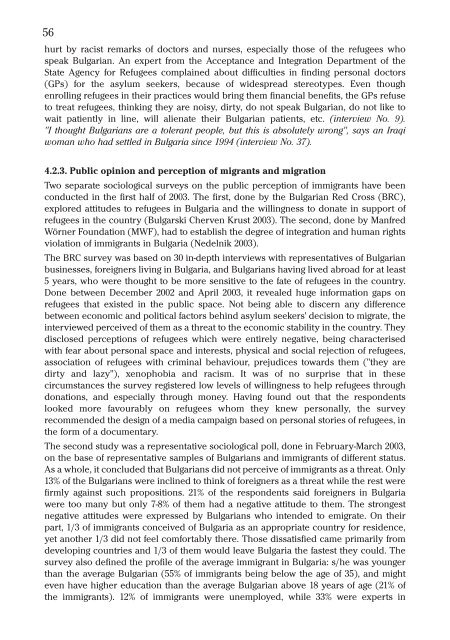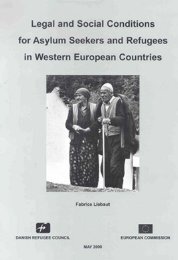Bulgaria - The social impact of seasonal migration
Bulgaria - The social impact of seasonal migration
Bulgaria - The social impact of seasonal migration
You also want an ePaper? Increase the reach of your titles
YUMPU automatically turns print PDFs into web optimized ePapers that Google loves.
56<br />
hurt by racist remarks <strong>of</strong> doctors and nurses, especially those <strong>of</strong> the refugees who<br />
speak <strong>Bulgaria</strong>n. An expert from the Acceptance and Integration Department <strong>of</strong> the<br />
State Agency for Refugees complained about difficulties in finding personal doctors<br />
(GPs) for the asylum seekers, because <strong>of</strong> widespread stereotypes. Even though<br />
enrolling refugees in their practices would bring them financial benefits, the GPs refuse<br />
to treat refugees, thinking they are noisy, dirty, do not speak <strong>Bulgaria</strong>n, do not like to<br />
wait patiently in line, will alienate their <strong>Bulgaria</strong>n patients, etc. (interview No. 9).<br />
"I thought <strong>Bulgaria</strong>ns are a tolerant people, but this is absolutely wrong", says an Iraqi<br />
woman who had settled in <strong>Bulgaria</strong> since 1994 (interview No. 37).<br />
4.2.3. Public opinion and perception <strong>of</strong> migrants and <strong>migration</strong><br />
Two separate sociological surveys on the public perception <strong>of</strong> immigrants have been<br />
conducted in the first half <strong>of</strong> 2003. <strong>The</strong> first, done by the <strong>Bulgaria</strong>n Red Cross (BRC),<br />
explored attitudes to refugees in <strong>Bulgaria</strong> and the willingness to donate in support <strong>of</strong><br />
refugees in the country (Bulgarski Cherven Krust 2003). <strong>The</strong> second, done by Manfred<br />
Wörner Foundation (MWF), had to establish the degree <strong>of</strong> integration and human rights<br />
violation <strong>of</strong> immigrants in <strong>Bulgaria</strong> (Nedelnik 2003).<br />
<strong>The</strong> BRC survey was based on 30 in-depth interviews with representatives <strong>of</strong> <strong>Bulgaria</strong>n<br />
businesses, foreigners living in <strong>Bulgaria</strong>, and <strong>Bulgaria</strong>ns having lived abroad for at least<br />
5 years, who were thought to be more sensitive to the fate <strong>of</strong> refugees in the country.<br />
Done between December 2002 and April 2003, it revealed huge information gaps on<br />
refugees that existed in the public space. Not being able to discern any difference<br />
between economic and political factors behind asylum seekers' decision to migrate, the<br />
interviewed perceived <strong>of</strong> them as a threat to the economic stability in the country. <strong>The</strong>y<br />
disclosed perceptions <strong>of</strong> refugees which were entirely negative, being characterised<br />
with fear about personal space and interests, physical and <strong>social</strong> rejection <strong>of</strong> refugees,<br />
association <strong>of</strong> refugees with criminal behaviour, prejudices towards them ("they are<br />
dirty and lazy"), xenophobia and racism. It was <strong>of</strong> no surprise that in these<br />
circumstances the survey registered low levels <strong>of</strong> willingness to help refugees through<br />
donations, and especially through money. Having found out that the respondents<br />
looked more favourably on refugees whom they knew personally, the survey<br />
recommended the design <strong>of</strong> a media campaign based on personal stories <strong>of</strong> refugees, in<br />
the form <strong>of</strong> a documentary.<br />
<strong>The</strong> second study was a representative sociological poll, done in February-March 2003,<br />
on the base <strong>of</strong> representative samples <strong>of</strong> <strong>Bulgaria</strong>ns and immigrants <strong>of</strong> different status.<br />
As a whole, it concluded that <strong>Bulgaria</strong>ns did not perceive <strong>of</strong> immigrants as a threat. Only<br />
13% <strong>of</strong> the <strong>Bulgaria</strong>ns were inclined to think <strong>of</strong> foreigners as a threat while the rest were<br />
firmly against such propositions. 21% <strong>of</strong> the respondents said foreigners in <strong>Bulgaria</strong><br />
were too many but only 7-8% <strong>of</strong> them had a negative attitude to them. <strong>The</strong> strongest<br />
negative attitudes were expressed by <strong>Bulgaria</strong>ns who intended to emigrate. On their<br />
part, 1/3 <strong>of</strong> immigrants conceived <strong>of</strong> <strong>Bulgaria</strong> as an appropriate country for residence,<br />
yet another 1/3 did not feel comfortably there. Those dissatisfied came primarily from<br />
developing countries and 1/3 <strong>of</strong> them would leave <strong>Bulgaria</strong> the fastest they could. <strong>The</strong><br />
survey also defined the pr<strong>of</strong>ile <strong>of</strong> the average immigrant in <strong>Bulgaria</strong>: s/he was younger<br />
than the average <strong>Bulgaria</strong>n (55% <strong>of</strong> immigrants being below the age <strong>of</strong> 35), and might<br />
even have higher education than the average <strong>Bulgaria</strong>n above 18 years <strong>of</strong> age (21% <strong>of</strong><br />
the immigrants). 12% <strong>of</strong> immigrants were unemployed, while 33% were experts in

















